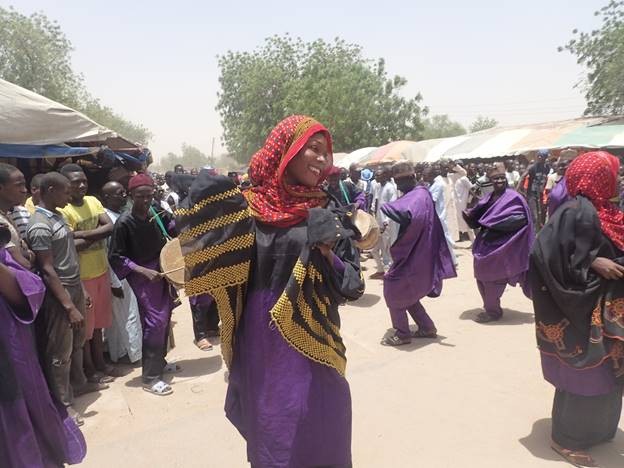
May 2017—Momodu Fanndi Bukar had been attending the sada’a in his northeast Nigeria community of Nganzai for as long as he can remember—more than 50 years. A sada’a is a village-wide, town hall-type meeting where friends, family and neighbors gather for Islamic prayer and discourse on the issues of the day.
Nganzai once had a longstanding reputation as one of the most robust local government areas in Borno state, and its recurring sada’a—which included guidance from civic and religious leaders, dancing and feasting—was not to be missed. But in 2010, the insurgent Islamist group Boko Haram began to conduct raids on the area’s villages, and the sada’a, among other public gatherings, was cancelled.
The people of Nganzai and neighbors in surrounding villages have spent the last seven years hunkered down in fear of the pillaging cruelty and radical ideology of the terrorist outfit. Without the ritual and camaraderie of the festival, the community lost its solidarity and direction, said local leaders, and the people held little hope for the future.
In early 2017, things began looking brighter. The Nigerian military largely drove Boko Haram out of the villages and into the forest, allowing the local government to take inventory of their surviving civic infrastructure and human resources. After years of fear, it was finally possible to re-establish the social order and rhythms of the villagers’ pre-conflict lives.
USAID has made a comprehensive response to the Boko Haram crisis, providing more than $450 million in humanitarian assistance in the last two years to keep famine at bay and disease from spreading throughout the 1.7 million displaced in the Lake Chad Basin. But the Agency also looks to address the factors that lead to the rise of terrorist groups like Boko Haram in conflict-affected countries around the world. In Nigeria, these factors include poor service delivery by local government, and a perceived unresponsiveness to the grievances of rural communities.
Working under the premise that confidence in the secular state leads to the rejection of radical ideas, USAID’s Office of Transition Initiatives issues small grants to fund reconstruction of schools, health posts, town offices, and police stations to improve perception of local government in Nigeria. These gestures of around $100,000 each across the region may seem a drop in the bucket given the scope of the need, but they nonetheless have been effective in renewing confidence in the authorities.
In Nganzai, local officials and civic leaders yearned to resurrect the sada’a, and while the military could ensure security at a new event, the financially destitute government could not cover its modest cost. A USAID grant provided funding for the festival and helped to restore confidence in local authorities.
More than 3,000 people flocked to the village as the first resurrected sada’a took place last month. Prayer sessions and goodwill messages from village officials and elders encouraged confidence. The chief imam of Nganzai expressed joy at the gathering, and prayed for the success of security forces and ad hoc community youth militias for their courageous effort in tackling insurgents through the long years and returning peace.
“I ate a very delicious meal, drank and even danced today,” said Hajja Ganna Baba Suur. “I have not seen for so many years what is happening here. Honestly, I am so happy—happy for everyone that everything will be back to normal again.”
Only time will tell if the ordeal is truly over for Nganzai and neighboring local government areas such as Monguno, Magumeri, Mafa and the state capital Maiduguri. Boko Haram remains out of sight, but not yet defeated.
USAID has provided similar grants to other villages to bring back their own sada’as, which have been marked with the same outpourings of joy and hope.
Abdu Bukar, who attended a similar event in Mafa, reasons that, if the local government can stage such a large event without any security issues, “surely it can attend to other basic needs of its people here.”
“This event makes me believe things will change soon,” said Bukar Kolo. “News of this will spread to other neighboring LGAs [local government areas], and surely people will finally feel that yes, peace has returned to Nganzai. Today, thousands of people were able to gather here without fear. Alhamduillah [Praise be to God]!”
LINKS







Comment
Make a general inquiry or suggest an improvement.